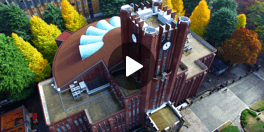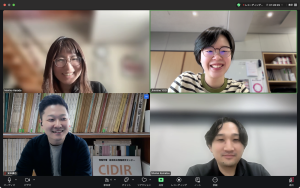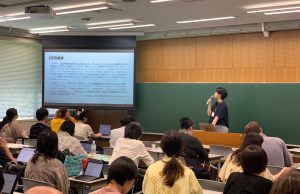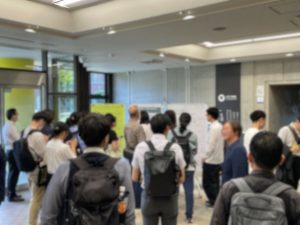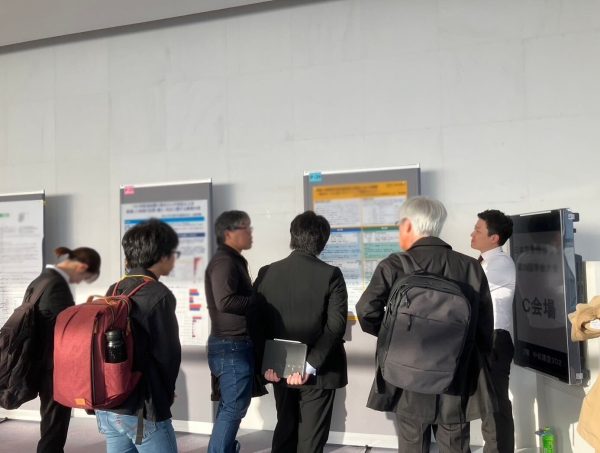
March 3, 2025
オンライン座談会:経験者に聞く「学会運営の裏側」(後編)Online roundtable : Ask the experienced “Behind the Scenes of Academic Society Management”(Part 2)
今回、学会運営の裏方で経験を積んできているメンバーでオンライン座談会を開催し、学会運営の大変さや魅力について聞きました。本記事は、前編と後編に分けて掲載します。前編では学会運営に参加するきっかけと業務内容などについて伺いました。後編では、学会の特徴や学会運営の工夫、今後の展望を伺いました。(ウェブサイト&ニュースレター編集部)(前編はこちら)
We held an online roundtable discussion with members who have experience in academic society management. In this article, we present the discussion in two parts. The first part covered how they became involved in academic societies and what types of tasks they perform. In this second part, we discuss the different characteristics of academic societies, innovative management strategies, and future prospects.(Website & Newsletter Editorial Team)(Part1)
[English text will follow the Japanese text]
柳:私が所属している学会は基本的に大学などの研究機関に所属している研究者が中心です。産業界から参加されている方もいますが、割合としては 少ないんじゃないかと思います。もう一つ所属している学会は産業界からの参加が半数を占めています。退職後に大学の先生として活動している方も多く、学会ごとに雰囲気が大きく異なります。
安本:私が所属する学会では、研究者だけでなく行政や企業の人も多く参加しています。学会発表がそのままニュースとして取り上げられることもあり、実務とのつながりが強いのが特徴です。
柳:私の研究分野では、博士課程になってから学会デビューすることが多く、学部生や修士の段階では学会にあまり入らない雰囲気があります。もちろん大会とかは全然来てもらっても大丈夫ですが。現在は、院生を増やそうという取り組みが強く打ち出され、院生の参加が増えています。修論発表会や途中経過の発表も可能なポスターセッションを設け、学生のエントリーのハードルを下げています。
小松:私が所属する学会では学生が少ないです。一方、テクノロジーに興味を持つ若手の参加が増えています。特に、文系と理系の橋渡し的な分野として注目されているため、文系の方は技術に、テック系の人材が関心を持ち始めていますね。
他に所属しているテクノロジー系の学会は、学部生などもっと若い人が参加していると思います。学会ごとに異なる特色を活かしながら、より開かれた学会運営を目指すことが求められていると思います。
安本:査読のハードルを上げすぎないことが若手の参入を促す要因になっています。また、発表賞もあるので、発表の機会を求めて参加する若手も多いです。会員でなくても参加可能な会も設けて、学生が卒論・修論研究成果を出しやすい場として活用されています。ただ、学生は就職などがあるので継続的な参加というのが難しいのが現状だと思います。
柳:懇親会でお酒だけでなくケーキやコーヒーを提供したところ、若手や女性の参加が増えました。小さな改革でも、学会の雰囲気が変わることを実感しています。あとは私もいま学生なので言ってみると、学会の年会費にも学割があるとありがたいですね(笑)
安本:私の場合、学会を通じて温かく見守られていると感じることが多いですね。防災系の学会では特に社会とのつながりが強く、学会がきっかけで研究が実社会に結びつくこともあります。また、学会の中でネットワークを作っておくことは、将来独立して研究室を持つ際にも非常に役立つと感じています。特に、学会の活動を通じて、上の世代の研究者と信頼関係を築くことで、新たな研究テーマを見つけたり、問題意識を共有したりできる点が魅力です。例えば、最近ではテレビ局の方と南海トラフ地震の情報伝達に関する議論を行ったことが、私の研究テーマの発展につながりました。
柳:本当にたくさん勉強させてもらっていると思います。あと、変な意味ではない「出会いの場」なので(笑)いろんな分野のいろんな方とお会いして、いろんな話が聞けるのですごく楽しいし、贅沢な経験だと思うことが多いです。
また、特に私自身が留学生として感じていることですが、学会には留学生も多く参加していて、留学生の割合もどんどん増えていると思います。国籍や身分に関係なくフラットに接してもらえるため、研究の場として非常にありがたい環境だと感じています。
原田:私は多分学部の4年生ぐらいからずっとなんだかんだ学会は入っていて、そこでかわいがってもらった先生に今もお世話になってたりとかもするので、早いうちから学会に入ることは楽しいと思います。もし研究の世界に入らなくても、学会には企業の方とか、いろんなセクターの方いらっしゃるので、卒業した後に研究職でなくても、学会にちょっと勉強に行こうかなっていうきっかけになると思います。
安本:学会は単なる研究の発表の場ではなく、研究者としての就職活動やキャリア形成の場としての役割も果たしていると思います。学会での発表が就職活動に直結することもあります。研究発表を通じて「この人いいな」と思われることがあり、実際に学会での繋がりが進路に影響を与えることもあると聞きました。
原田:子供がいるためオンライン学会がなくなると困る立場です。地方の学会に参加するのが難しくなります。さらに言うなら、平日開催の学会の方が参加しやすかったりもします。以前はオンラインで研究会や大会を実施していましたが、現在は対面が主流です。託児所もありますが子連れの移動を考えるとまだ託児所の利用はできていません。
小松:ハイブリッド開催は非常にコストがかかるのが課題です。オンラインとオフラインの準備を両方行うのは手間が多く、ネットワーク確認や技術的なトラブル対応が必要になります。そのため、ハイブリッドよりも完全オンラインの方が運営側としては楽ですね。
安本:私が所属する学会は飲み会文化が強いのと、発表後の議論がとても大切という認識があります。オンライン開催では学会後の議論が生まれにくい点が問題です。議論ができる環境が減ると研究の発展にも影響があるので、オンライン開催はどんどん減る方向にあります。ほぼ、学会大会の発表は対面に誘導する方向へシフトし、勉強会などはたまにオンラインで開催されています。
柳:年2回ある大会のうち、一回を完全対面で、一回を完全オンラインとしています。オンライン開催の方が院生の発表者数が増える傾向にあり、かつ海外の研究者を招待する国際シンポジウムもプログラムに組み込んだりしています。対面の学会では、託児所の設置などサポートも充実していますが、おっしゃる通りなかなか移動のことを考えると難しい面もあると思うので、課題だと思います。
全員:運営側として、ハイブリッドは大変なので、控えてほしいです(笑)
小松:私は今年初めて研究大会の運営に関わりましたが、普段接する機会のない先生方とフラットな立場でイベントを企画できるのは、新たな発見や学びが多くありました。特に若手は体力や実行力が求められますが、それが学会の場で大きな役割を果たしていると感じました。また、学会活動を通じて飲み会などの場で業界の裏話を聞くこともあり、学術の枠を超えた知識が得られるのも面白いですね。
若手は技術感度が高く、従来のやり方に疑問を持つことが多いです。その視点を大切にしながら、学会運営をシステマチックに改善し、より楽に効率的に運営できるようにしていきたいです。
安本:もっと私が所属する学会をもっと盛り上げていきたいです。学会って社会的には、何をやっているのかわからないところがあると思うので、学会の魅力をもっと発信して、研究者だけでなく、メディア関係者や行政などさまざまな人が参加しやすい環境を作っていきたいです。
柳:私は修士課程からずっと同じ研究室にいるので、他大学の先生や他分野との交流が少なかったのですが、学会に関わることで他大学の先生方と一緒に仕事するようになったことでかわいがってもらったり、研究の相談もできるようになりました。学会の仕事を通じて築いた関係がその後も続くかどうかは自分次第だと思いますが、少なくともその手がかりとなるネットワークを作れる点は、学会の運営に関われてよかったと思っています。
今後の展望というか、個人的にはもっと若手の院生だったり、女性の方だったり、いろんな人が楽しく参加できる場として学会を盛り上げていけたらなと思っています。
原田:私は複数学会に所属していますが、運営に携わった学会以外ではアウェー感が強く、話す人がいないことが多いです。そんな中で、運営に携わり知り合いが多い学会に行くとさまざまな分野の方と話せる場があるのはとてもありがたいですね。そのような学会は楽しく、発表の場としても居心地が良いですし、研究を続けるうえで大切だと思います。
ーーみなさんのご意見はこの座談会のレポートでお伝えさせていただきます。
今日は大変貴重なお話を伺うことができました。ご参加くださりありがとうございました。
企画:ウェブサイト&ニュースレター編集部
構成:柳志旼(博士課程)
構成・和/英訳:原田真喜子(特任助教)
英語校正:ディビッド・ビュースト(特別専門員)
[ENGLISH VERSION]
Yoo: The academic society I belong to mainly consists of researchers affiliated with universities and other research institutions. There are also participants from industry, but they are in the minority. However, in another society I am part of, about half of the members come from industry. Many retired professionals continue their academic careers as university professors, so the atmosphere varies significantly between societies.
Yasumoto: In my academic society, we have not only researchers but also people from government and private companies. Since research presentations often make the news, the society has strong connections with practical fields.
Yoo: In my field, many researchers make their debuts in academic societies during their Ph.D. studies. There is a general tendency for undergraduates and master’s students not to join societies at an early stage. Of course, they are welcome to attend conferences. Recently, there has been a strong push to increase the number of graduate students. To lower the barriers to entry, we have introduced poster sessions where students can present their master’s thesis research or preliminary findings.
Komatsu: In my society, there are very few students. However, we are seeing an increase in young participants interested in technology. Since our field bridges the humanities and sciences, we see a growing number of humanities researchers interested in technology and technology researchers interested in the humanities.
I also belong to another technology-focused academic society, which has more undergraduate participants. I believe each academic society needs to embrace its unique characteristics while also working towards a more open and inclusive environment.
Yasumoto: One way to encourage young researchers to participate is to avoid raising the peer review hurdle too high. We also offer presentation awards, which attract many early-career researchers looking for opportunities to present their work. Some societies allow non-members to participate, making it easier for students to present their bachelor’s or master’s thesis research. However, students often struggle to continue participating once they start working.
Yoo: At a social gathering, we served cake and coffee alongside alcoholic beverages, which led to an increase in participation from younger members and women. Even small changes can significantly impact the atmosphere of a society. Also, as a student myself, I’d appreciate a student discount on membership fees! (laughs)
Yasumoto: I often feel a strong sense of support and mentorship within my society. Disaster prevention societies, in particular, have strong connections with society, and my research has been directly linked to real-world applications.
Additionally, networking within an academic society can be very beneficial for the future. For example, I recently had discussions with a television station about information dissemination during the Nankai Trough earthquake, which has directly influenced my research direction.
Yoo: I feel like I’ve learned a tremendous amount through my academic society. Also, it serves as a great networking platform—I’ve met many people from various fields and had fascinating discussions. It’s an invaluable experience.
As an international student, I also appreciate that academic societies welcome members regardless of nationality or status. The environment is very inclusive and allows me to engage in research discussions on an equal footing.
Harada: I’ve been involved in academic societies since my undergraduate years, and I still receive support from professors I met back then. Even if one doesn’t pursue an academic career, societies provide networking opportunities with professionals from different sectors. This makes academic societies a great place for continued learning, even after graduation.
Yasumoto: Academic societies are not just platforms for presenting research—they also play a role in career development. Sometimes, presenting at a society can directly lead to job opportunities. I’ve heard cases where researchers were noticed during a presentation and later received job offers through their academic network.
Harada: As a parent, I would struggle if online conferences disappeared. Traveling to in-person conferences, especially those held in rural areas, can be difficult. Additionally, weekday conferences are often easier for me to attend than weekend ones. While online conferences were common during the pandemic, most events are now back to in-person. Although childcare services are available at some conferences, traveling with children remains a challenge.
Komatsu: The biggest issue with hybrid conferences is the cost. Managing both online and in-person events simultaneously requires significant effort, including network setup and troubleshooting technical issues. From an organizational standpoint, fully online conferences are much easier to manage than hybrid ones.
Yasumoto: My society places a strong emphasis on social gatherings and post-presentation discussions, which are difficult to facilitate in an online format. Since reducing opportunities for discussion could hinder academic progress, we are shifting back toward in-person events. Most major conferences are now held face-to-face, with only occasional online study sessions.
Yoo: Our society holds two conferences per year—one fully in-person and the other fully online. Online conferences tend to attract more graduate student presenters and allow us to host international symposiums with researchers from abroad. In-person conferences provide good support, such as childcare services, but travel remains a challenge. This is an area that needs further consideration.
All: From a management perspective, hybrid events are extremely challenging, so we’d prefer to avoid them! (laughs)
Komatsu: This was my first year being involved in conference management, and it was an eye-opening experience. Collaborating with professors on an equal footing in an open environment provided many learning opportunities. Physical strength and executive abilities are often expected of young members, but this is where they play a crucial role.
I also enjoyed the informal conversations, where I was able to get in on the inside stories of the field and gain knowledge beyond the framework of academia. Since younger generations are more tech-savvy, we often question traditional methods. I hope to systematize academic society management and make it more efficient and accessible.
Yasumoto: I want to make my society more vibrant. Academic societies often seem opaque to the public, so I’d like to increase outreach and attract not only researchers but also media professionals and government officials.
Yoo: Since my master’s program, I have been in the same research lab, which limited my interactions with other universities and fields. However, getting involved in society management has allowed me to collaborate with faculty from different institutions, build strong relationships, and seek research advice.
Whether these connections last depends on individual effort, but academic societies provide an excellent foundation for networking. In the future, I’d like to help create an inclusive environment where more young researchers, women, and diverse participants feel welcome.
Harada: I belong to multiple academic societies, but in those whose management I am not involved, I sometimes feel like an outsider. In contrast, in societies where I have an active role, I have many acquaintances and feel comfortable engaging in discussions. This makes a big difference in enjoying and benefiting from conferences. I think this sense of belonging is important for continuing research.
This roundtable discussion provided valuable insights into the often-overlooked aspects of academic society management. Thank you all for sharing your experiences and perspectives!
Organized by the Website & Newsletter editorial team
Text: Jimmine Yoo (Ph.D. Student)
Text & Translation: Makiko Harada (Project assistant professor)
English proofreading: David Buist (Project Senior Specialist)

